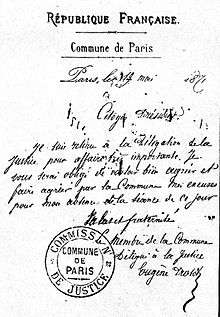Eugène Protot
Eugène Protot, born in the French town Carisey in the province of Yonne, on 27 January 1839 and died in Paris 17 February 1921 was a political figure during the Paris Commune.
The Paris Commune and The Third French Republic
During the Siege of Paris (September 1870 - March 1871), he was elected major of the National Guard, and defended some participants uprising of October 31, 1870 against the Government of National Defense. On 18 MArch 1871, he was called the City by Central Committee. On 24 March 1871, with Maxime Lisbon and Paul Antoine Brunel, he commanded the demonstration against the Mayor of the 1st arrondissement of Paris. On 26 March 1871, he was elected to Council of the Commune by 11th arrondissement of Paris. He proposed and voted on the " Decree of the hostages." He sat on the board of the Justice where he became Minister on 18 April. He led a major policy reforms and remove concerns to justice its aristocratic character. The principal measures are inspired in the sense of a free justice rendered by judges elected, however they cared to ensure Individual freedom. In particular, it abolishes expenses Usher and lawyer and ordered that all public offices stand free acts within their jurisdiction. But first he had to overcome the disruption caused by the departure of many officials to Versailles creating a Chamber of the Court (26 April) and appointing Justices of the Peace (3 May) and of judges (7 and 16 May), pending the complete reconstruction of the court civilians by universal suffrage. Prototype also tried to obtain a nominal state of remand and pushed the city to establish a commission to visit the prison for will receive complaints from prisoners. Always with the intention to remove any arbitrary, he asked to be kept informed of all the movements of inmates in insane asylums.

He fought on the barricades during the Bloody week. Injured he managed to escape and fled to Geneva in October 1871 and Lausanne. He was sentenced to death by the Council of War in November 1872. Lucien Descaves in his novel Philemon describes his life of outlaws : " Prototype, former delegate to the Justice, who took pension with André Slomszynski, at the pastor Besançon, receiving his pension a small, washed her clothes in a bowl and assiduously perfected in the study of foreign languages, while Slom drew for ' illustrated Switzerland. "
He returned to France after the amnesty of 1880, but the board of Law Society refused to reinstate the bar. After unsuccessfully ran for the nomination Blanquist Paris ( who preferred him Frédéric Boulé) for the by-election of 27 January 1889 he was a candidate few months later Marseille headquarters of Felix Pyat. Determined opponent Guesde and Marxist, crystallized his fight against the celebration of the Labor Day on 1 May by socialist Marxist of the French workers Party. He has this severe judgment on Paul Lafargue.
Social democracy has placed an in-law of the Prussian Karl Marx, the heimatlos Lafargue , Cuba during the 1870 war not to fight his German family , naturalized French by M. Ranc, to support political radicals , French MP elected by the clerical side Lille for an alliance with the papists of the extreme right , introducer of anti-patriotism in France , author of " ? La Patrie , keksekça " where the dismemberment of France is just as predicted , something fatal and imminent. Manifests of the revolutionary Commune against May 1.
His analysis of Marxism is final. In 1892, he wrote in Chauvins and reactors :
Under the inspiration of the Social Democrats in Berlin , Marxism failed French socialism in mild and contemptuous philanthropy, good treatment to the workers, the concern of the government for the working [classes...] the leaders of the neo- Christian socialism , oligarchs , former officials of the Empire , graduate of Humanities and Sciences , share this insolent caste prejudice , that the people are composed of individuals of a lower case [...] the idea of washing people is a monomania Marxists.
Protot was also a renowned orientalist, a graduate of the School of Oriental languages to the Arab and Persian languages which helped to live his last years, and which he would have liked to spend more time. He contributed to the World Journal musulman[1] of 1906 to his death in 1921.
References
Sources
- Eugène Protot, Manifeste de la Commune révolutionnaire aux travailleurs de France, 1 May 1893.
- Charles Da Costa, Les blanquistes, éditions Rivière, 1912.
- Roger Price, People and politics in France, 1848–1870, Cambridge, 2004.